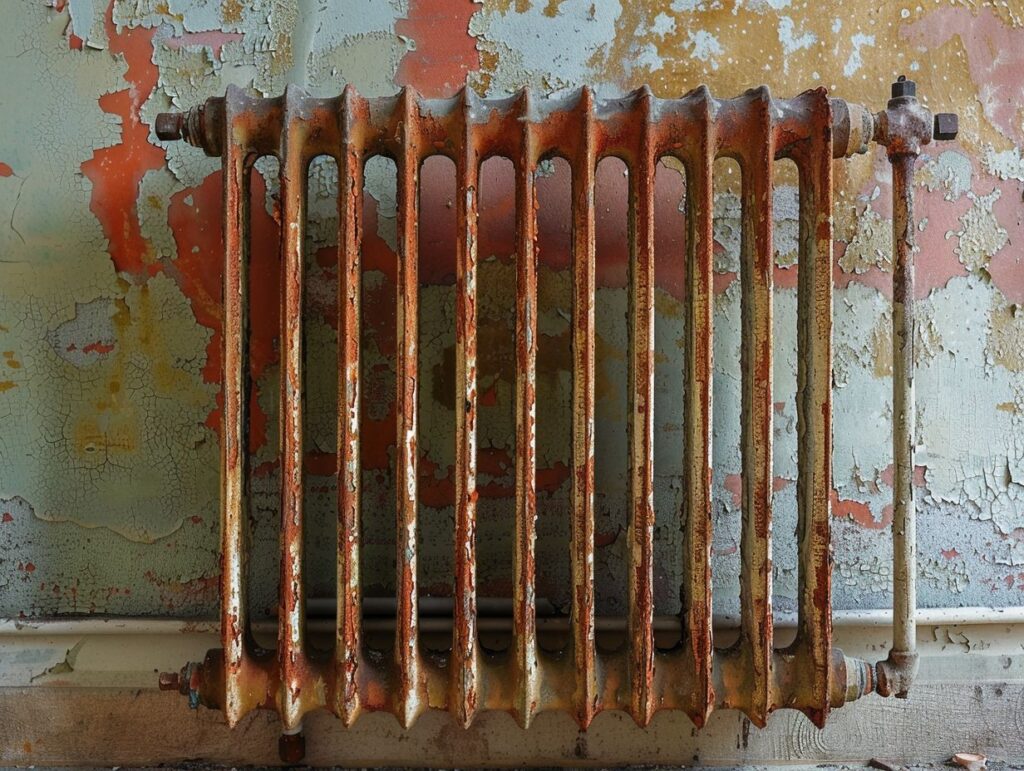Kitchen radiators are essential for maintaining warmth and comfort in your kitchen, but when rust becomes a problem, it can impact their performance. The causes of rust on kitchen radiators often stem from moisture and exposure to oxygen. Understanding the effects of rust on their efficiency and potential health risks is important.
Explore preventative measures against rust, including do-it-yourself techniques and professional solutions for its removal. By learning more about how to preserve the condition of your kitchen radiators, you can ensure they continue to function effectively.
Key Takeaways:
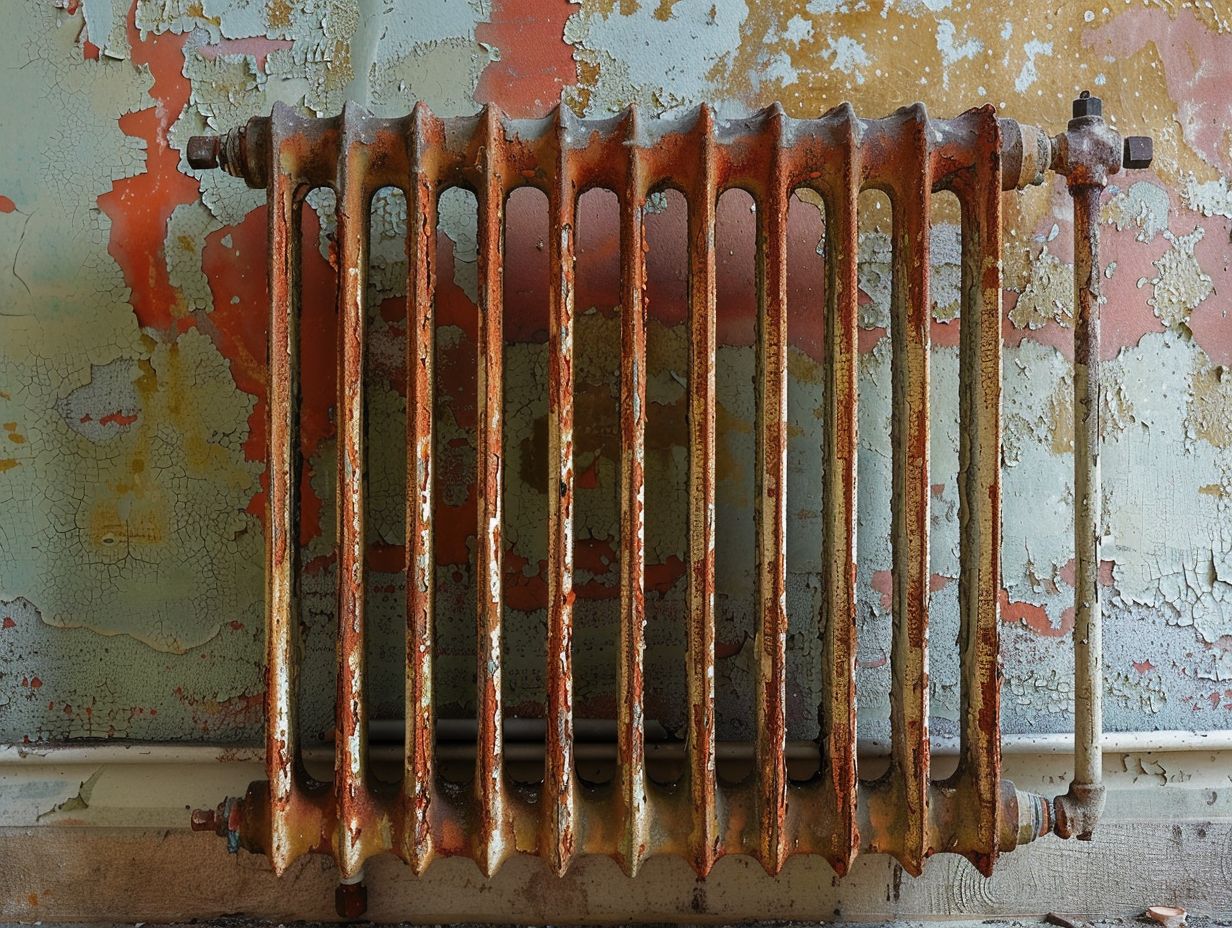
- Kitchen radiators can rust due to exposure to moisture and oxygen, which can lead to reduced efficiency and potential health concerns.
- Regular maintenance and cleaning, as well as using protective coatings and sealants, can help prevent rust on kitchen radiators.
- In the event of rust, there are DIY methods and professional solutions available to remove it and restore the functionality of kitchen radiators.
Causes of Rust on Kitchen Radiators
The occurrence of rust on your kitchen radiators can be attributed to various factors, including external influences such as exposure to moisture, leading to the corrosion of metal components like steel, brass, and copper. Galvanic corrosion, a common rusting process, can also contribute to the deterioration of radiator materials.
Moisture stands out as one of the primary culprits in causing rust on kitchen radiators. When moisture comes into contact with the metal surfaces of your radiators, it initiates a chemical reaction that results in the formation of rust. This process is further aggravated in environments with high humidity levels.
On the other hand, galvanic corrosion occurs when two different metals are in contact with each other in the presence of an electrolyte, causing one metal to corrode more rapidly. This can significantly impact the durability of your radiators, particularly when they are constructed from a combination of steel, brass, or copper components.
Moisture and Humidity
Moisture and humidity have a significant impact on accelerating the rusting process of kitchen radiators, particularly when metal surfaces are consistently exposed to water. To mitigate the effects of rust caused by moisture, it is important to properly coat radiators with paint and regularly inspect them for signs of corrosion.
The presence of moisture creates an ideal environment for oxidation on metal surfaces, leading to rust formation. When water interacts with the iron in radiators, it triggers a chemical reaction that gradually weakens the metal. Without a protective coating like paint, the risk of rust formation significantly rises.
By applying a rust inhibitor in addition to a durable paint coating, an extra layer of protection can be added against corrosion induced by moisture. Regularly examining your radiators for any signs of rust is essential for early detection and prompt resolution of issues, underscoring the significance of preventive maintenance in extending the lifespan of your heating system.
Exposure to Oxygen
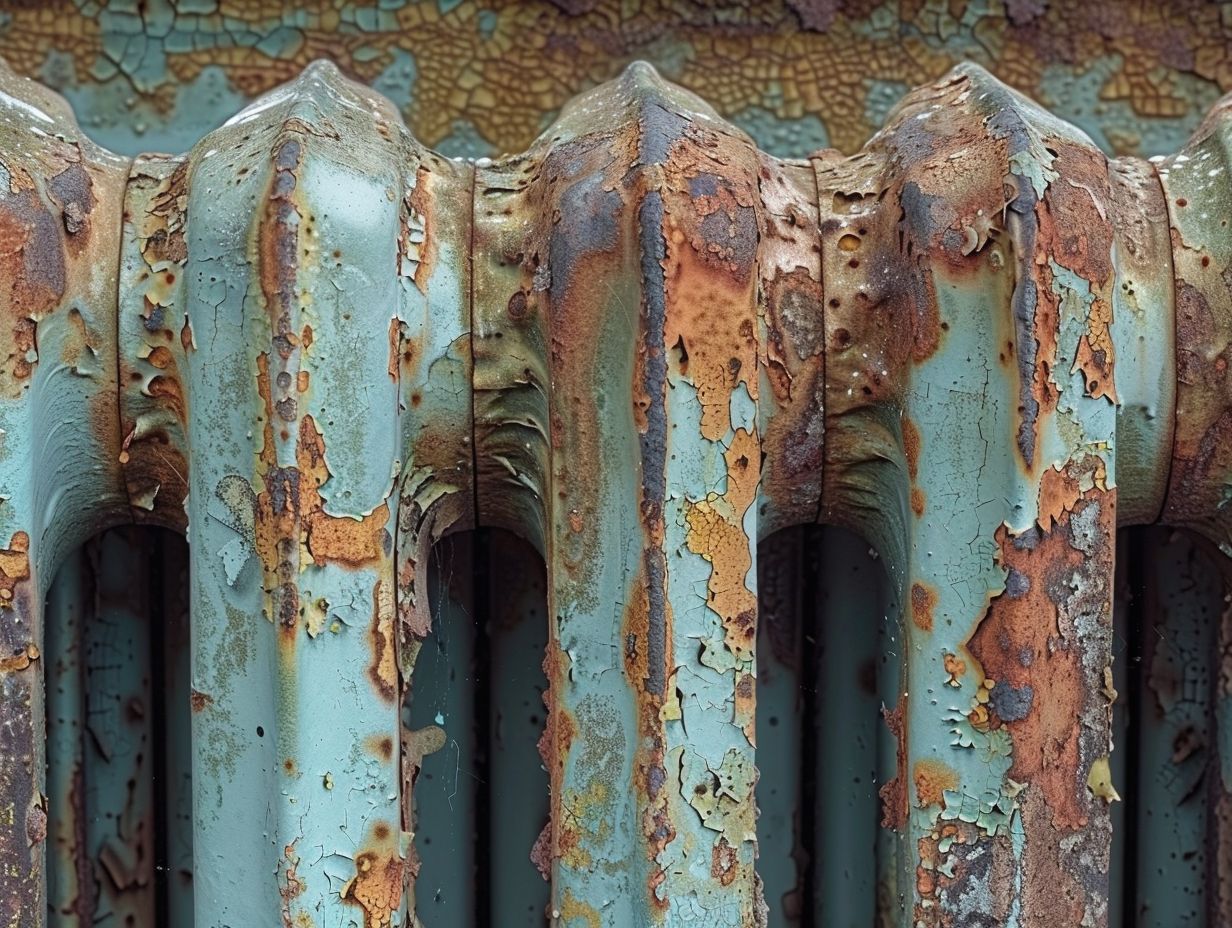
Exposure of kitchen radiators to oxygen can result in rust formation, leading to blockages in valves and pipes due to the accumulation of corrosion by-products such as magnetite.
The rusting process is initiated when metal surfaces come into contact with oxygen, causing internal and external corrosion. The presence of rust and corrosion can have adverse effects on the efficiency and longevity of the radiator system.
The accumulation of magnetite, an iron oxide, can lead to the creation of sludge that obstructs valves and hinders the flow of hot water, reducing the effectiveness of the heating system.
Over time, these obstructions can cause uneven heat distribution and increased energy consumption as the radiator struggles to compensate. Regular maintenance and implementation of rust prevention strategies are crucial to extending the lifespan of kitchen radiators and ensuring optimal performance.
Effects of Rust on Kitchen Radiators
The presence of rust on your kitchen radiators can result in reduced efficiency of your central heating system, impacting the overall performance and heat distribution within your kitchen area. Damage caused by corrosion can compromise the effectiveness of your radiator system, potentially leading to heating issues.
When rust builds up within your radiator system, it can obstruct the flow of hot water, resulting in uneven heating throughout your kitchen space. This inconsistent heat distribution not only makes it difficult to maintain a comfortable temperature but also puts strain on your entire heating system, potentially increasing energy consumption and operational costs.
Rust-related problems may also cause leaks or blockages in the pipes, further worsening heating inefficiencies and posing the risk of expensive repairs if left unattended.
Reduced Efficiency and Functionality
Accumulation of rust on kitchen radiators can have a significant impact on their efficiency and functionality, hindering the transfer and circulation of heat. Implementing rust inhibitors and chemical treatments can help address corrosion-related issues and restore the optimal performance of your radiator system.
Over time, the build-up of rust can result in blockages within the radiator, which can impede the flow of hot water and reduce the amount of heat emitted into the room. This can lead to a less comfortable living environment and cause your heating system to operate harder, consuming more energy and potentially resulting in higher utility bills.
By utilising rust inhibitors and specialised chemical solutions, you can prevent the formation of rust, extending the lifespan of your radiator and ensuring effective heat distribution throughout your home.
Potential Health Concerns
Rust on kitchen radiators can result in the accumulation of sludge within your system, which may pose health risks due to the presence of internal contaminants. The build-up of sludge, caused by corrosion, can compromise the water quality and overall hygiene of your heating system.
This situation is particularly concerning because if these internal contaminants are not effectively managed, they could potentially seep into your water supply. This not only impacts the efficiency of your heating system but also jeopardises the health of those using the water for various purposes.
Consuming or being exposed to water contaminated by rust-derived sludge can lead to negative health consequences, such as skin irritations and respiratory issues. It is essential to prioritise routine cleaning and maintenance of your kitchen radiators to mitigate these health risks.
Preventing Rust on Kitchen Radiators
To prevent rust on your kitchen radiators, you need to implement proactive measures to counteract the effects of rusting on the system components. Utilising rust inhibitors, protective coatings, and chemical treatments can effectively safeguard your radiators against corrosion and prolong their lifespan.
These preventative measures create a protective barrier on the surface of your radiators, inhibiting the formation of rust. Rust inhibitors work by interrupting the oxidation process, whilst protective coatings offer an additional layer of defence against moisture and environmental factors that contribute to rust development.
Incorporating corrosion-resistant chemicals into your heating system helps to maintain the integrity of your radiators by reducing the impact of corrosive elements present in the air and water.
By consistently applying these strategies, you can ensure that your kitchen radiators stay rust-free and function efficiently for years to come.
Maintenance and Cleaning Tips
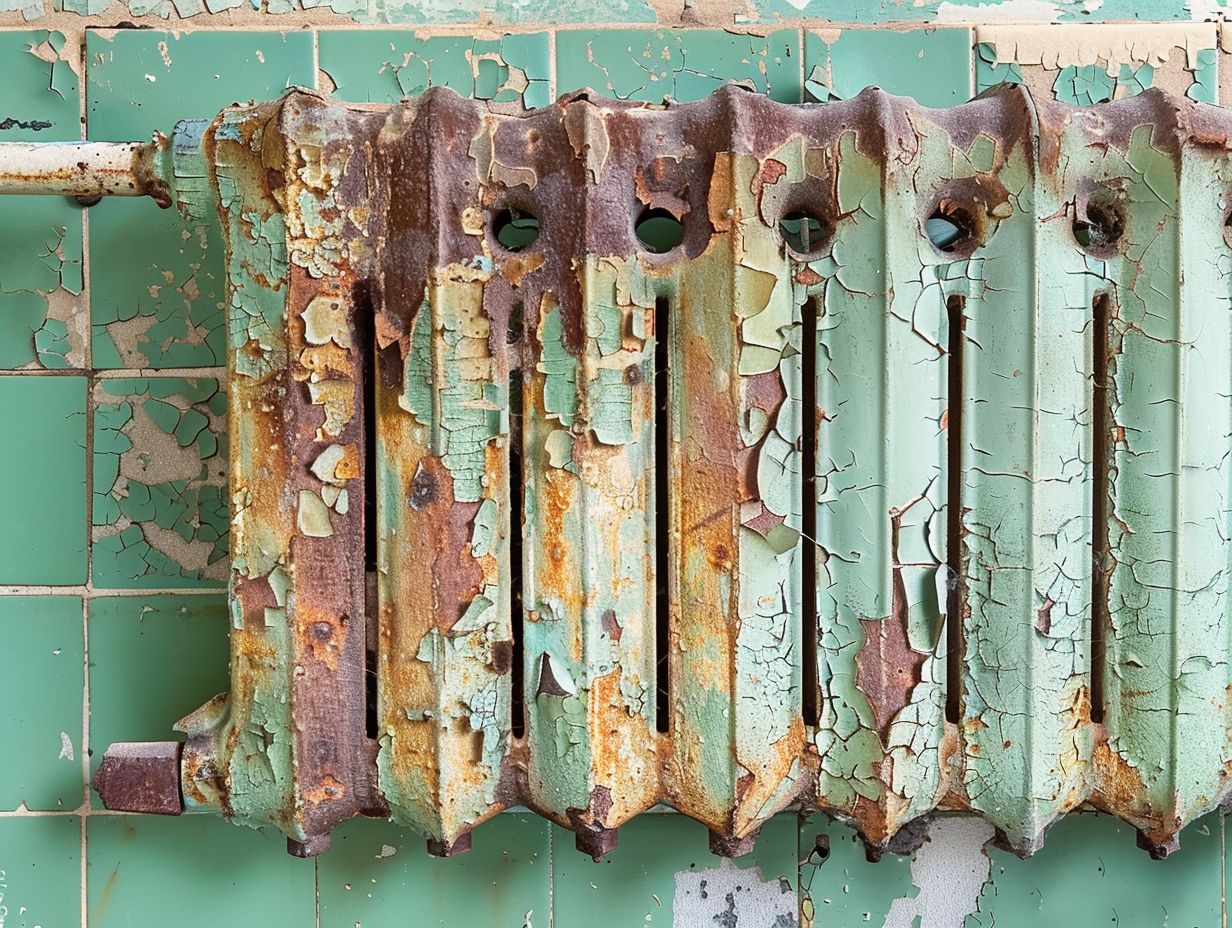
Regular maintenance and cleaning of kitchen radiators are essential for preventing water-related issues and inhibiting the onset of rust. To effectively maintain your kitchen radiators, it is crucial to implement proper cleaning techniques and ensure the efficient operation of the heating system, which can help extend the lifespan of your radiators.
To maintain your kitchen radiators effectively, it is advisable to bleed the radiators regularly to release any trapped air that can affect heating efficiency. Additionally, checking for leaks in the water system and promptly repairing them can prevent water damage and corrosion.
When cleaning your radiators, use a soft cloth or brush to remove dust and debris, avoiding abrasive materials that could scratch the surfaces. Applying a rust inhibitor can provide further protection against corrosion, particularly in areas prone to moisture buildup.
By following these maintenance guidelines, you can ensure that your kitchen radiators function optimally and remain in good condition for years to come.
Protective Coatings and Sealants
When applying protective coatings and sealants to kitchen radiators, you can provide external protection against rust formation and corrosion, ultimately improving the durability of the radiator materials. By incorporating rust inhibitors into coatings, a barrier is formed to shield radiators from environmental damage.
These protective coatings act as a protective shield, preventing moisture and other external elements from directly contacting the radiator surface. This is especially crucial in kitchen environments where high levels of humidity and temperature fluctuations are common.
By using appropriate materials such as epoxy, enamel, or ceramic coatings, you can ensure that the radiator maintains its structural integrity and aesthetic appeal over an extended period.
The inclusion of rust inhibitors not only delays the onset of corrosion but also aids in preserving the overall efficiency of the radiator. This makes it a cost-effective investment for any kitchen setup, ensuring long-term protection and functionality.
Removing Rust from Kitchen Radiators
Efficiently removing rust from kitchen radiators involves implementing targeted interventions to address internal corrosion on metal components like steel and brass. The utilisation of appropriate cleaning agents and rust removal techniques can prove instrumental in restoring the radiators to their optimal condition.
To commence the cleaning process, you should begin by draining the radiator system and carefully disassembling it to gain access to the steel and brass components. Subsequently, apply a high-quality rust removal agent using a brush or cloth, ensuring comprehensive coverage of the affected areas.
It is essential to allow the agent to sit for the specified time as per the product instructions to effectively penetrate and dissolve the rust. Following this, use a clean cloth to wipe off the loosened rust.
Additionally, employ a rust converter to treat any remaining rust spots and pre-empt future corrosion. Once the radiator has been reassembled, refill it with coolant and thoroughly inspect for any leaks or issues.
DIY Methods and Professional Solutions
When addressing rust on kitchen radiators, you have the option of employing DIY techniques or utilising professional solutions tailored to target specific issues like galvanic corrosion. Protective paint coatings and preventive measures can be effective in combating rust accumulation.
For minor rust spots, cost-effective DIY methods such as using vinegar or bicarbonate of soda can be utilised. However, in more severe cases, professional interventions like sandblasting or chemical rust converters may be necessary.
To determine the most appropriate removal method, it is essential to identify the root cause of rust, such as galvanic corrosion caused by the contact of different metals. Applying protective paint coatings can act as a shield against moisture and oxygen, preventing future rust formation and prolonging the lifespan of kitchen radiators.
By implementing these preventive strategies, homeowners can reduce the risk of rust-related issues and ensure the efficiency of their heating systems is maintained.
Frequently Asked Questions
What causes kitchen radiators to rust?
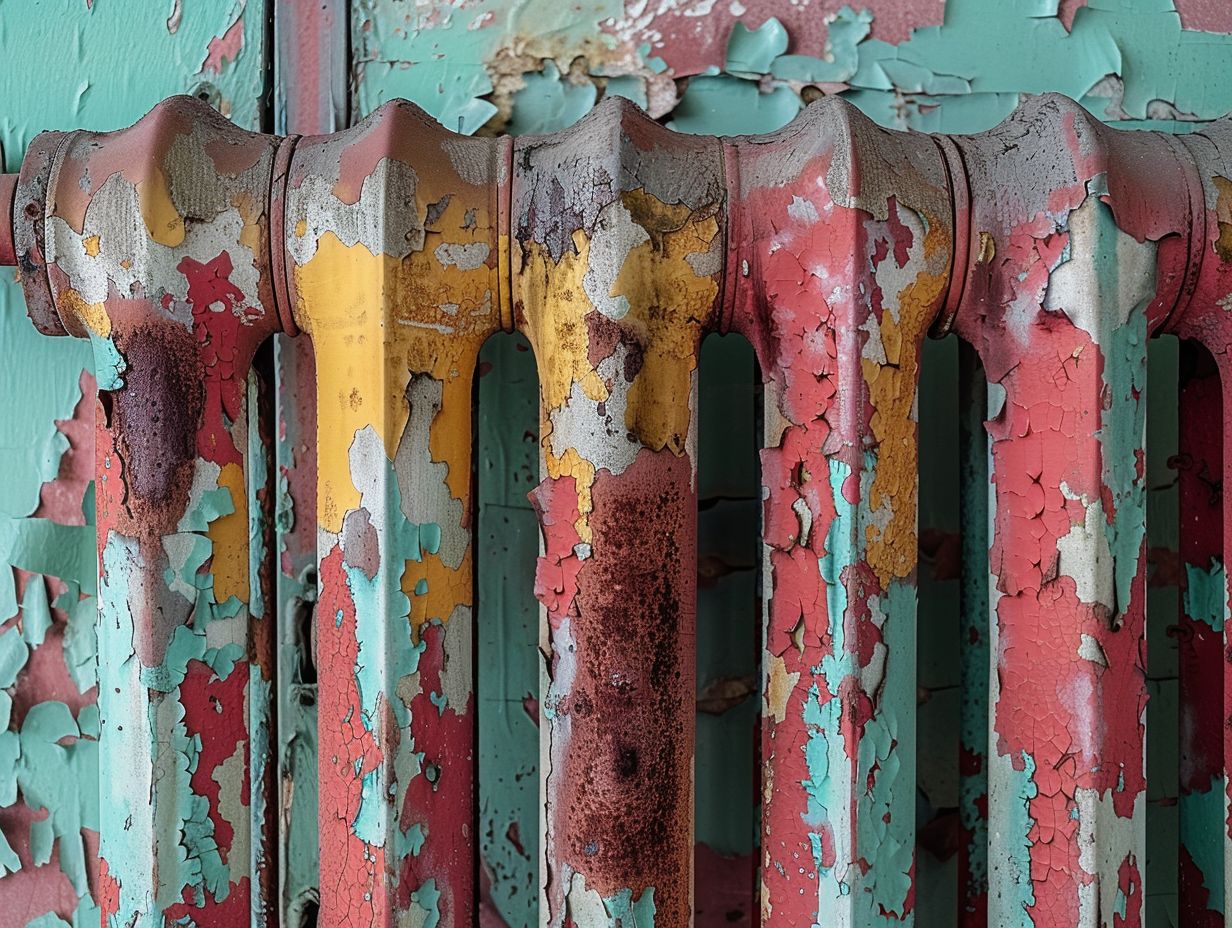
Kitchen radiators rust due to a combination of moisture, oxygen, and metal. When these elements come into contact with each other, they create a chemical reaction that leads to rust formation.
Why do kitchen radiators rust more quickly than other types of radiators?
Kitchen radiators are more prone to rusting because they are often exposed to higher levels of moisture and heat. Kitchens tend to have higher humidity levels and the presence of steam from cooking can accelerate the rusting process.
Can rust on kitchen radiators be prevented?
Yes, rust on kitchen radiators can be prevented by taking proper maintenance and prevention measures. These include regularly cleaning and drying the radiator, keeping the surrounding area dry, and using rust-inhibiting products.
How can I remove rust from my kitchen radiator?
You can remove rust from your kitchen radiator by using a commercial rust remover or a mixture of vinegar and baking soda. Apply the solution to the rusted areas and let it sit for a few minutes before scrubbing and rinsing it off.
Do kitchen radiators need to be replaced if they rust?
In most cases, rust on a kitchen radiator can be removed and the radiator can continue to function properly. However, if the rust has caused significant damage to the structure of the radiator, it may need to be replaced.
Are certain types of kitchen radiators more prone to rusting than others?
Yes, some types of kitchen radiators, such as cast iron radiators, are more prone to rusting than others. This is because they have more exposed metal surfaces and are not coated with a protective layer like some other types of radiators.

